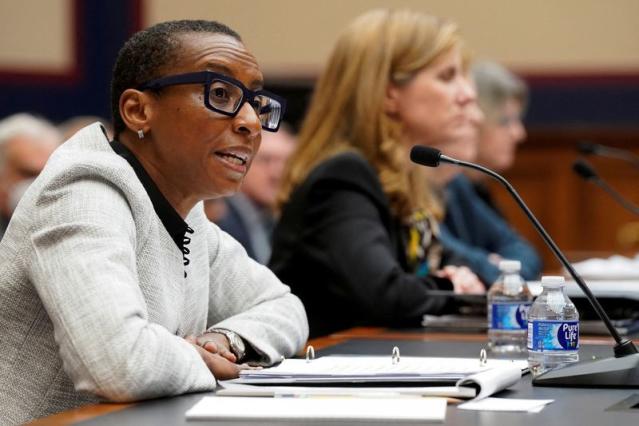Claudine Gay, the embattled president of Harvard, will remain in the role, the university’s highest governing body announced Tuesday, following almost a week of outcry over testimony she gave at a congressional hearing on antisemitism.
“As members of the Harvard Corporation, we today reaffirm our support for President Gay’s continued leadership of Harvard University. Our extensive deliberations affirm our confidence that President Gay is the right leader to help our community heal and to address the very serious societal issues we are facing,” the board said in a statement signed by the college’s fellows.
“President Gay has apologized for how she handled her congressional testimony and has committed to redoubling the University’s fight against antisemitism,” the statement said.
Gay became the university’s presidency less than six months ago. She is the second woman and first Black person to lead the Ivy League institution.
Gay and her counterparts at the University of Pennsylvania and the Massachusetts Institute of Technology drew fierce criticism after they appeared at a House hearing last week and seemed to dodge a question of whether students calling for the genocide of Jews should be punished.
In a contentious exchange with Rep. Elise Stefanik, R-N.Y., Gay said “that type of speech is personally abhorrent to me” and “at odds with the values of Harvard.”
Stefanik then pressed Gay: “Can you not say here that it is against the code of conduct at Harvard?”
Gay did not answer directly, saying in part: “We embrace a commitment to free expression even of views that are objectionable, offensive, hateful — it’s when that speech crosses into conduct that violates our policies against bullying, harassment, intimidation.”
In an interview with the Harvard Crimson student newspaper published Friday, Gay apologized for her remarks and said in part: “I got caught up in what had become at that point, an extended, combative exchange about policies and procedures.”
“I failed to convey what is my truth,” she said.
The presidents’ testimony went viral on social media and drew condemnation from the White House, lawmakers, Jewish community advocates, alumni and donors. The backlash has been driven in part by Stefanik and billionaire investor Bill Ackman.
The furor thrust Harvard into crisis, and demands that Gay leave her job seemed to gain steam over the weekend after Penn President Liz Magill stepped down. Magill had drawn scrutiny for responding to Stefanik’s line of questioning in similarly legalistic terms.
However, Gay received support Monday from a large group of Harvard professors and alumni. More than 700 members of the faculty, including the constitutional law scholar Laurence Tribe, signed a letter urging administrators to resist calls for Gay’s removal.
“We … urge you in the strongest possible terms to defend the independence of the university and to resist political pressures that are at odds with Harvard’s commitment to academic freedom, including calls for the removal of President Claudine Gay,” they said in the letter.
“The critical work of defending a culture of free inquiry in our diverse community cannot proceed if we let its shape be dictated by outside forces,” the letter went on to say. NBC News obtained the text of the letter from history professor Alison Frank Johnson, one of the faculty members spearheading the effort.
In a separate letter, the executive committee of the Harvard Alumni Association said it “unanimously and unequivocally” backed Gay. “We have full confidence in her leadership during this difficult time,” the committee members wrote.
The news that Gay would remain in her office was first reported by the Crimson, citing an unnamed source familiar with the decision.
The Harvard Corporation also addressed accusations of plagiarism against Gay, saying in its statement that the university first learned of the allegations in late October. The board said the school carried out an “independent review” of her published scholarship in her career as a political scientist.
The board reviewed the results over the weekend and found “a few instances of inadequate citation.” But the review did not find any violations of the university’s standards for research misconduct, according to the board.
“President Gay is proactively requesting four corrections in two articles to insert citations and quotation marks that were omitted from the original publications,” the board said.

